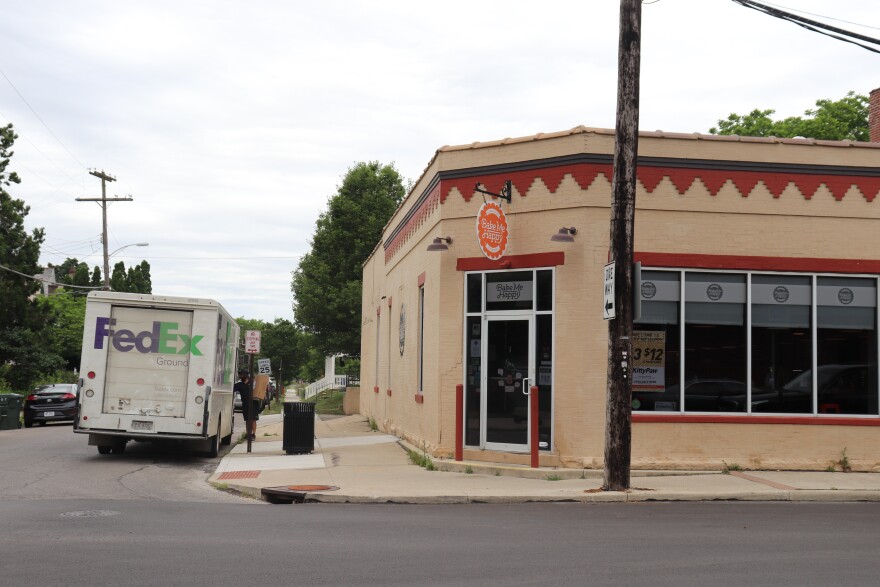Inside Bake Me Happy, Letha Pugh clears off a bench outside the kitchen where employees stir frosting and arrange cupcakes on platters. Once the pandemic started, Pugh says bakery lost all of its wholesale orders, which included shipments to large clients like Ohio State and Denison University.
In response, the Merion Village café started selling more savory goods.
“Our sales here in the shop have actually increased, just because we realized we were a niche in the food chain,” Pugh says. “I think what we realized from all of this is the grocery stores can’t support everybody at the same time.”
Since everything at the café is gluten-free, Pugh says the business honed in on serving a specific population. And in April, the city of Columbus began Buy Black Thursday – an effort to encourage people to spend their money at businesses owned by Black residents.
“Before this all happened, we were on this trajectory of doing a little more diversity in the allergy-free world,” Pugh explains. “And we see a lot more African Americans coming in who deal with Crohn’s Disease or irritable bowel. When they eat GF, they do do better.”
Buy Black Thursday has helped bring in more Black customers, Pugh says.
“The gluten-free world is a pretty white world in general," she says. "So it’s been good for us. Just from an exposure, I always want my people here. It’s always very comforting.”
Before the pandemic, Bake Me Happy was one of 125 businesses that were registered with the Central Ohio African American Chamber of Commerce. Columbus City Council president Shannon Hardin says 250 more have registered since.

“This is not a city thing anymore, people are just doing it," Hardin says. "It actually spread outside of Columbus. It started up in Cleveland a couple weeks after we did it. Now, I think it’s its own living thing.”
Cincinnati launched its own effort in May.
The idea of spending money in a targeted community is not new, but Hardin says it was important for the city to think especially of racial minorities, since they would be hit hardest by the pandemic's closures.
Although the effort started a couple of months ago, Columbus does not have exact numbers on Buy Black Thursday’s economic impact thus far. The city is working with the African American Chamber Of Commerce to compile those numbers.
“The thing about small businesses that I learned when I became chair of the committee several years ago is that most of these businesses are one or two people,” Hardin says.
Because of their size, Hardin says it’s been hard for the city and chamber to keep track of success rates among individual businesses.
“We have not taken the time just to engage and ask them the questions about who’s still here, just because they’re so focused on keeping their business alive," he says.
A Chance For Discovery
According to the chamber, Central Ohio is home to approximately 20,000 Black-owned businesses.

Creole Kitchen chef Henry Butcher says the pandemic has shifted their business model.
“The carryout is carrying us. It’s carrying the whole place right now. So that tells you how good the carryout is doing,” Butcher says. “During coronavirus we had people donating money so we fed the University East hospital, the doctors and nurses.”
Butcher moved to Columbus when he was a child, and started working in restaurants at 16. Creole Kitchen is in Mount Vernon Plaza, and although Ohio has allowed dining rooms to reopen, Butcher's remained closed.
The first Buy Black Thursday immediately boosted the restaurant, Butcher says.
“We were just overrun, as a matter of fact, it was like a runaway freight train,” Butcher says.
Even after the initial rush, he's still seeing fruitful consequences.
“I’d known about it but forgotten about it, then all of a sudden people started coming in from everywhere,” Butcher says. “I was like, ‘Where are all these people coming from?’ Then a lady came in and said, ‘You know, Buy Black restaurant day.’”

Pugh says without the intentional effort of Buy Black Thursday, some customers would not have found her bakery.
“I don’t think people would have just kind of ventured in here, and we’re off the beaten path," she says. "We’re kind of tucked down in a neighborhood.”






